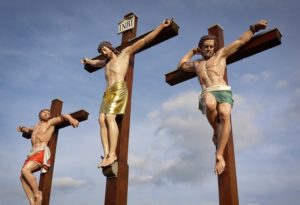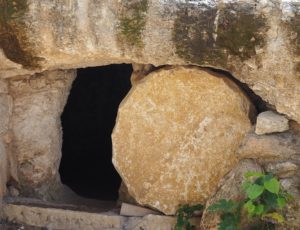Having entered the season of the year in which many people celebrate the crucifixion and resurrection of Jesus, it seemed the appropriate time to pull this book off my shelf. In Six Hours One Friday, Max Lucado tells of the impact Jesus’ last hours on the cross make on our lives. The book is one of the Chronicles of the Cross series, but it easily stands on its own.

I’ve never met a Max Lucado book I didn’t like. His teachings are deep, yet simple, and he presents them by weaving together personal stories, both moving and humorous; retellings of biblical events from a purely unique Max Lucado perspective; invented scenarios from biblical times; and everyday situations we can all relate to.
Max begins this work with one of those personal stories to illustrate the importance of the book’s content. He relates his adventure of trying to protect his houseboat from an expected hurricane and his inexperience that made him look like he was in an episode of McHale’s Navy. But then someone offered him sage advice: Your only hope is to anchor deep.
In Six Hours One Friday, Max examines three anchor points that will withstand any storm in our lives. These anchor points were “planted firmly in bedrock two thousand years ago by a carpenter who claimed to be the Christ”—and he did it all during six hours one Friday. To the casual observer, there was nothing unusual about these six hours, yet “they were the most critical hours in history.”

Anchor Point #1—My life is not futile.
We can easily be wearied by the fast pace of life and subsequent questions such as Is it worth it? and Do I matter to anyone? that creep into our minds. They can lead us into lonely, depressed, stagnant, isolated, or tragic places. But God has given us an anchor in knowing that someone is in control and we have a purpose.

The Samaritan woman (John 4:1-42) was weary, lugging her heavy water jug to the well in the heat of the day to avoid knowing glances and sharp tongues. When she encountered a man who looked at her like she was somebody and spoke to her with respect, her shame disappeared. Her meeting with the Christ caused her to leave her burden, the water jar, and run to the city to tell everyone of this Messiah to whom she mattered.
Max tells how difficult it was to leave his oldest daughter in the hands of others on her first day of school. She had belonged only to her parents for four years, but now he had to “give her up.” As he walked away, God gave him this verse: “He who did not spare his own Son, but gave him up for us all—how will he not also, along with him, graciously give us all things?” (Romans 8:32).
God gave up his Son—knowing how cruelly he would be treated, knowing the unthinkable task that awaited him, knowing that when his Son needed his comfort the most, he would not be able to offer it—and he did it for us. So how can we doubt his love? Yet we do. And Max says that when doubt comes, we should escort it to the cross where it was clearly shown that “God would give up his only Son before he’d give up on you.” With someone who cares for us so deeply and gave up everything for us, our lives are not futile.

Anchor Point #2—My failures are not fatal.
Our failures are not who we are. God made us; we are not mistakes. Though he may not like what we do, God loves who we are.
Max says we collect failures until we end up with a bag so heavy we have to drag it. We struggle to have a clean conscience. Paul said, “the wages of sin is death” (Romans 6:23). Sin is fatal. But . . .
A woman caught in the act of adultery is brought to Jesus to be stoned (John 8: 1-11). But he is the only one who does not condemn her. He sends her away without even a scolding, just the words “Go now and leave your life of sin.” He does not see her failures but who she was created to be.
The prodigal son (Luke 15:11-24) returns home having squandered his inheritance in a string of failures. He comes repentant and willing to accept whatever consequences befall him. However, his father welcomes him without a word of reproach and with open arms.

A thief, who had joined soldiers, religious leaders, and others in the crowd in mocking Jesus (Matthew 27:44), now hangs on a cross beside him. He watches as Jesus doesn’t resist the nails and isn’t angry at the insults. He hears him speak of his executioners, “Father, forgive them, for they do not know what they are doing” (Luke 23:34). He dares to request what he knows he doesn’t deserve. “Jesus, remember me when you come into your kingdom” (Luke 23:42). Jesus promises it will be so—because that is exactly why he is hanging there.
Jesus threw his arms wide open on the cross and had them nailed there to say to us we can always come home. Our failures are not fatal.

Anchor Point #3—My death is not final.
Max says death is a bully, taunting us that we will die someday. We know he’s right, but we do all manner of things to postpone that day. Death’s plan is to scare us, to “make you so afraid of dying that you never learn to live.” During Jesus’ ministry on earth, he shows us death doesn’t have the last word.
He touches a coffin being carried in a funeral procession and tells the dead son to get up. The young man sits up and begins talking. Jesus gives what had been stolen back to his widowed mother (Luke 7:11-17).
A daughter has died and mourners have gathered. Jesus enters the house, takes her hand, and tells her to rise. Life returns and she stands up. Jesus gives her back to her parents (Luke 8:41-56).
Lazarus has lain dead four days. As Jesus stands among the crowd outside his tomb, he weeps—but not for Lazarus. “He wept not for the one in the cave of death but for those in the cave of fear . . . He wept for those who, though free, were prisoners, held captive by their fear of death.” Jesus calls Lazarus out of the tomb so the people will see God (John 11:1-44).
But after all they saw, they were still prisoners. So Jesus had to “submerge himself in the water of death before people would believe that death had been conquered.”
This book is Max Lucado’s look at those six hours on Friday during which Jesus set anchor points so your life has purpose, your failures can be forgiven, and your death is an entrance to greater life. Though Lenten season is a great time to read Six Hours One Friday, any time is appropriate. We need these anchor points every day to help us withstand the storms of life.
The last 70 pages of the book are a Reader’s Guide that can be used in small groups or for personal devotionals. For each chapter there are questions to reexamine what you’ve read, related scripture passages to dig deeper, and practical exercises to help apply the teachings.
The Golden Goblet

This entire book is excellent, but Chapter 10, “The Golden Goblet,” is an extraordinary account of the purpose and struggle of the crucifixion. It begins with Jesus on the cross but flashes back to the Garden of Eden where the purpose was established and to the Garden of Gethsemane where Jesus struggled with the task before him. What is so special is Max’s scenarios of God’s interactions with his angels and his conversations with Jesus. They depict the anguish of both Father and Son to reveal how deeply God loves us.
Please check it out here. (I found it posted on another blog.) I plan to keep it handy to reread whenever I need to be reminded of what God gave up for me.
Scripture quotations are from NIV.
Quotations other than scripture are from Six Hours One Friday.






Brenda Murphy
March 15, 2022It is amazing how incredible those six hours were. Thanks for the insight into what Jesus did and why he did it. Learning about it never gets old, and I am forever grateful. 🙂
bspencer
March 15, 2022Thanks to Max Lucado for this insight. I do love to hear new (to me) accounts of what transpired. And I’m with you on the “forever grateful” part. Thanks, Brenda.
Angie Camp
March 16, 2022I have written these 3 anchors on kitty paper to place on my kitchen cupboard for repeated reminders. I also like the phrase: “escort doubt to the cross.” And we can escort every thought that is not true or pure to His cross! Angie
bspencer
March 16, 2022Yes, we can–and should. Every thought that is contrary to God. Thank you, Angie.
Dolores R. Birkle
March 18, 2022I have enjoyed this blog immensely. The love of God is amazing. I am so happy to be reminded of the eternal love that we can access on a daily basis!
Dolores
bspencer
March 18, 2022I’m glad you enjoyed the content, Dolores. I was so happy to share the truths from this book.